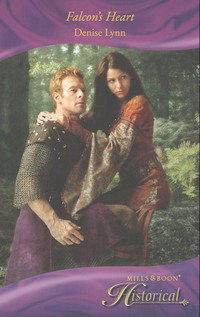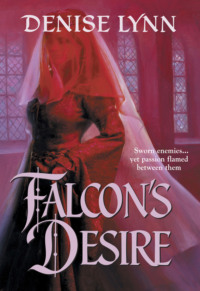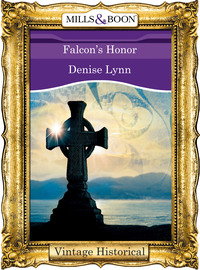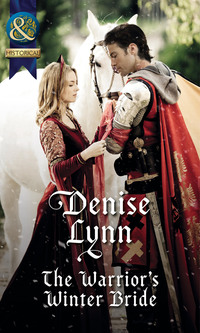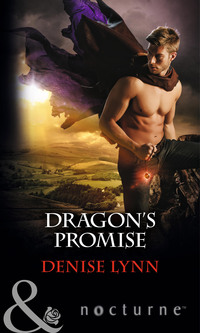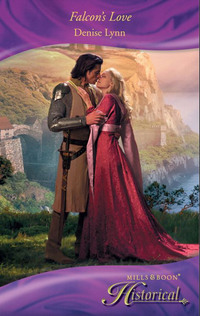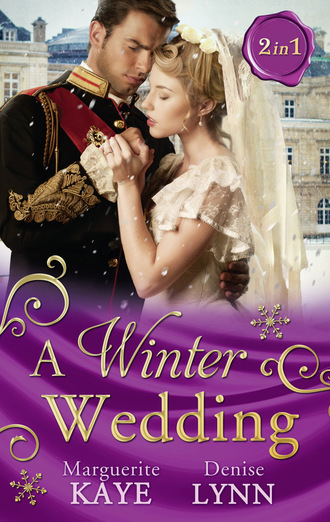
Полная версия
A Winter Wedding
She knew exactly what he meant. She was experiencing that very problem. ‘More?’ Ainsley said, meaning it as an answer, though it sounded like a request.
‘More,’ Innes said, taking it as a request, pushing back his chair, leaning across the table, doing just as she asked.
* * *
He hadn’t intended to kiss her, but he couldn’t resist, and when she did not either, when she opened her mouth to him and twined her arms around his neck with the most delightful little sigh, his teasing kiss became something deeper. She kissed him back. The tip of her tongue touched his, triggering the rush of blood, the clenching of his muscles, the shiver of arousal. He slid his hand down to her breast under the shawl that formed part of her bodice, only to find himself frustrated by the bones of her corset, by the layers of clothes. A knife clattered to the ground, and they both jumped.
He was hard. He was very glad that the table lay between them. Ainsley’s face was flushed, her lips soft, eyes dark with their kisses. The urge to pull her across the table and ravage that sinful mouth of hers was unbearably tempting. What the devil was wrong with him that he couldn’t seem to keep his hands off her! Sitting carefully back down in his chair, Innes thought ruefully that it had been the same right from their first meeting. Why hadn’t he realised it would be a problem? Was it a problem?
‘Mhairi could have come into the room at any moment,’ Ainsley said.
Innes ran his fingers through his hair. ‘Is that why you kissed me?’
She picked up a teaspoon and began to trace a pattern on the table. ‘Actually, you kissed me, though I cannot deny that I kissed you back,’ she said, looking at him fleetingly from under her lashes. ‘I don’t know why, save that I wanted to, and I haven’t wanted to for... And ever since I met you I have and—and so I did.’
‘I can’t tell you how relieved I am to hear that, because it’s been exactly the same for me.’ Innes swallowed a mouthful of cold coffee and grimaced. ‘I never was one to toe the line, you know. Maybe it’s because our bargain precludes it that I’m so tempted.’
‘You mean you want to kiss me because it is illicit?’
‘Oh, no, I want to kiss you because you have a mouth that makes me think of kissing. But perhaps it’s so difficult not to because I know it’s not permitted, even though we’re married.’ Innes shook his head and jumped to his feet. ‘I don’t know. Maybe we should check the armoury for a chastity belt.’
‘Maybe we should stop worrying about it, and discussing it and analysing it,’ Ainsley said. ‘We are adults. We are neither of us interested in becoming attached. There is no harm in us having some—some fun.’
‘Fun? You say that as if you are taking a dose of Mr Rush’s patented pills for biliousness.’
‘I am sure that they too are healthful.’
Innes burst out laughing. ‘You say the strangest things. Healthful! It’s the first time I’ve heard it referred to in that way.’
‘You think it’s an inaccurate term to use?’
She was frowning, looking genuinely puzzled, just as she had yesterday, now he thought about it, when she’d mentioned—what was it—marital relations? ‘I think it’s best if we think about something else entirely,’ Innes said. ‘Delightful as this breakfast has been, the day is getting away from us. First things first, we’ll start with a tour of the castle. I warn you, it’s a great barrack of a place and like to be as cold as an icehouse.’
Ainsley got to her feet. ‘I’ll go and fetch a shawl.’
The door closed behind her. Innes gazed out of the window, though the view was almost entirely obscured by an overgrown hedge. It looked as if it had not been cut for a good many years. Like everything he’d seen at Strone Bridge so far, from the jetty to the stables, it was neglected. Eoin had warned him that things had changed. He wondered, if the state of the house and grounds were anything to go by, what had happened to the lands. He was surprised, for though his father had been old-fashioned, archaic even in his practices, he had never been negligent. He was also angry, though guiltily aware he had little right to be so. These were Malcolm’s lands. If Malcolm was here, he would be appalled at the state of them. Yet if Malcolm were here, Innes would not be. If Malcolm was here, he would not have allowed the place to fall into decline, and Innes...
He cursed. He could go round in circles for ever with that logic. He was not looking forward to this tour of the castle. It wasn’t so much the state of disrepair he was now certain he’d find in the rooms, it was the history in those rooms, all his history. He didn’t want anyone to see him coping—or not coping—with that history, and Ainsley was a very astute observer. It had been fourteen years. Surely that was long enough for him to at least put on a show of disaffection. Yet here he was, feeling distinctly edgy and wondering how to explain it away.
The castle was just a building. A heap of stones and wood of dubious aesthetic value. There was no ancient law that said he must live there if he chose to remain on Strone Bridge after a year, which was highly unlikely. No, he would have the Home Farm made more comfortable, because nothing would persuade him to play the laird in the castle, not even for a few weeks.
The vehemence of this thought took Innes so aback he did not notice Ainsley had returned until she spoke his name. ‘Right,’ Innes said, sounding appropriately businesslike. ‘Let’s get on with it.’
Chapter Four
The sun shone weakly from a pale blue sky dotted with puffy clouds, the kind a child would paint. Following in Innes’s wake along the narrow path of damp paving slabs, Ainsley could see that the gloom inside the Home Farm’s lower rooms was largely due to the height of the untended hedge. Emerging through an extremely overgrown arch, she came face-to-face with Strone Bridge Castle for the first time.
They were standing at the side of a long sweep of carriageway with what must have been a huge lawn on either side, though at present it was more like the remnants of a hayfield, part long yellowed grass falling over, part fresh green pushing through. The building loomed over them, such an imposing structure she could not imagine how she had missed its hulk yesterday, though the stone was indeed the grey colour the sky had been.
Ainsley walked backwards to gain some perspective. ‘This is the rear of the house,’ Innes said. ‘The drive meets the main overland road, which cuts over to the other side of the peninsula and Loch Fyne, though to call it a road... It’s far easier to travel by boat in this neck of the woods.’
‘We did not come this way yesterday?’
He shook his head. ‘The front of the house faces down to the shore. We came up that way. I’ll show you, we’ll go in by the main entrance, but I wanted you to see the scale of this damned monstrosity first.’
Strone Bridge Castle was indeed enormous, and though it was not precisely charming, Ainsley would not have called it a monstrosity. An imposing construction with a large tower at each corner, and another central turret projecting from the middle of the main building, it was like a castle from a Gothic novel. The sturdy turrets had unexpected ogee roofs, adding a hint of the east into the architectural mix, each roof topped with tall spires and embellished with slit windows. The turrets looked, with their rugged masonry walls and stolid, defensive air, quite at odds with the central part of the building, which was considerably more elegant, mostly Jacobean in style, with four storeys of tall French-style windows, a low Palladian roof ornamented with a stone balustrade and a huge portico that looked as if it had been added on as an afterthought. The overall effect was certainly not of beauty, but it was striking.
‘It looks,’ Ainsley said, studying it with bemusement, ‘as if someone has jumbled up three or four different houses, or taken samples from a book of architectural styles through the ages.’
‘You’re not far off,’ Innes said. ‘The main house was built about 1700. The roof and that central tower were added about fifty or sixty years after that, and my own father put those corner towers up. There’s no rhyme nor reason to it. As I said, it’s a monstrosity.’
‘That’s not what I meant at all. It is like nothing I have ever seen.’
‘One of a kind. That, thank heavens, is certainly true,’ Innes said grimly.
‘You are not fond of it, then?’ Ainsley asked. ‘Though there must be some interesting stories attached to a building so old. And perhaps even a few ghosts.’
He had taken her arm as they made their way over the untended lawn around the building, and now slanted her a curious look. ‘Do you believe in such things?’
‘Honestly, I’ve never considered the question before, but looking at this place, I could easily be persuaded.’
‘There is a tale of one of the lairds who went off to fight in the 1715 Jacobite uprising. He was for the Old Pretender. There’s a set of gates, right at the end of the carriageway, which he had locked, so they say, and made his wife promise never to unlock them until his return.’
‘What happened?’
‘He died in the Battle of Sheriffmuir. His wife had the gates unlocked for his corpse to pass through in its coffin, but—’ Innes broke off, shaking his head. ‘No, there’s enough here already to give you nightmares without adding a walking, wailing, clanking ghost to the mix.’
Ainsley stopped in her tracks, looking up at him in horror. ‘Walking and wailing and clanking?’
He bent down to whisper in her ear. ‘He rattles the chain that should have been kept around the gates. He walks just over there, on the carriageway. He wails for the treachery of his lady wife, who married his enemy less than a year after he was slain.’
She shuddered, looked over to where he was pointing, then looked back at him. ‘Have you actually seen him?’ Innes made a noncommittal noise. Ainsley narrowed her eyes suspiciously. ‘Has anyone ever seen him?’
‘None who have lived to tell the tale,’ he answered sorrowfully.
She punched him on the arm. ‘Then how can the tale be told! You made that up.’
He laughed, rubbing his arm. ‘Not all of it. The first part was true. The laird at the time did fight, he did die at Sheriffmuir and he did have the gates locked.’
‘Are there any real ghosts?’
His laughter faded as he took her arm and urged her on. ‘Plenty, believe me, though none that you will see, I hope.’
His expression was one she recognised. Don’t ask. Not because she wouldn’t like the answers, but because he would not. This was his home, this place that he was mocking and deriding, this place that he called a monstrosity. She wondered, then, if he really meant the bricks and mortar. Yesterday it was obvious that Innes had not wanted to come back to Strone Bridge. It was equally obvious from this morning that he’d not expected the place to be in such a state of disrepair, but now she wondered what else there was to disturb him here. What was at the heart of the quarrel that had so completely estranged him from his father?
How little of Innes she knew. His formative years had been spent here, yet he had left all of it behind without, it seemed, a backward glance, to make a new and very different life for himself. Why? It was all very well to tell herself it was none of her business, but—no, there was no but. It was absolutely none of her business, Ainsley told herself rather unconvincingly. Yet it was strange, and very distractingly intriguing, like the man himself.
‘You were a million miles away. I was only teasing you about the ghosts. I didn’t mean to give you the jitters,’ Innes said, cutting in on her thoughts.
‘You didn’t.’ Ainsley looked around her with slight surprise. They had reached the front of the house, and the prospect was stunning, for it sat on a hill directly above the bay where they had landed yesterday. ‘My goodness, this is absolutely beautiful.’
‘That’s the Kyles of Bute over there, the stretch of water with all the small islands that you sailed yesterday,’ Innes said. ‘And over there, the crescent of sand you can see, that’s Ettrick Bay on Bute, the other side of the island from which we set sail. And that bigger island you can just see in the distance, that’s Arran.’
‘I don’t think I’ve ever seen such a wonderful prospect. It is exactly the sort of view that one conjures up, all misty-eyed, when one thinks of the Highlands. Like something from one of Mr Walter Scott’s novels.’
‘Aye, well, strictly speaking Eoin was right in what he said yesterday, though. We’re only a wee bit farther north than Glasgow here, and Arran is south.’
‘As the crow flies,’ Ainsley said. ‘It doesn’t matter, it feels like another world, and it really is quite spectacular. There must be a magnificent view from the castle.’ She looked back at the house, where a set of long French-style windows opened out on the first floor to what must have once been a beautiful terrace at the top of a flight of stairs.
‘That’s the drawing room,’ Innes said, following her gaze.
‘How lovely to take tea there on a summer’s day. I can just imagine the ladies of old with their hoops and their wigs,’ she said dreamily.
‘The hoops and wigs are like as not still packed away up in the attics somewhere. My family never throws anything away. Do you really like this place?’
‘It’s entrancing. Do you really not like it?’
Innes shrugged. ‘I can see it’s a lovely view. I’d forgotten.’
Without waiting on her, he turned on his heel and began to walk quickly up the slope towards the central staircase. ‘Like someone determined to swallow their medicine as quickly as they can and get it over with,’ Ainsley muttered, stalking after him.
‘What was that?’
‘This may be a monstrosity to you, Innes, but to someone accustomed to a terraced house in Edinburgh, it’s magical.’
Innes stopped abruptly. ‘Ach, I’m like a beast with a sore head. I’m sorry. It’s not your fault.’
No, it was most definitely this place. Curious as she was, and with a hundred questions to boot, Ainsley had no desire to see him suffer. ‘We could leave it for today. Or I could look around myself.’
‘No,’ Innes said firmly, ‘it has to be done.’ He took her hand, forcing a smile. ‘Besides, you came here thinking you’d be lady of the manor—you’ve a right to see over your domain. I’m only sorry that it’s bound to be a disappointment.’
‘I did not come here with any such expectations. Aside from the fact that I know absolutely nothing about the management of a place this size, I am perfectly well aware that your people will regard a destitute Edinburgh widow without a hint of anything close to blue in her blood as nothing more than an upstart.’
Innes gave a startled laugh. ‘You’re not seriously worried that people here will look down their noses at you, Ainsley?’
‘A little,’ she confessed, embarrassed. ‘I hadn’t really thought about it until I arrived here yesterday. Then your boatman...’
‘Ach! Blasted Eoin. Listen to me. First, if there’s an upstart here, then it’s me. Second, for better or worse, I’ll be the laird while I’m here, and while you’re here, I will not tolerate anyone looking down their noses at you. Third, the state of your finances are nobody’s business but our own.’ He pulled her closer, pushing a strand of her hair out of her eyes. ‘Finally, though I have no intention of playing the laird and therefore there’s no need for you to play lady of the manor, if I did, and you did, then I think you’d play it very well. And on the off chance you couldn’t quite follow me,’ he added, ‘that was me saying you’ve not a thing to worry about.’
She felt a stupid desire to cry. ‘Thank you, I will try not to let you down.’
‘Wheesht, now,’ he said, kissing her cheek. ‘You’ll do your best, and that’s all I ask. Anyway, it’s not as if you are stepping into a dead person’s shoes. My mother died when I was eight years old.’
‘And your father never remarried?’
Innes gave a crack of laughter. ‘What for, he’d already produced an heir and a spare.’
‘What about your brother. Did he...?’
‘No.’
Another of those ‘do not dare ask’ faces accompanied this stark denial. And Innes would not be married either, were it not for the terms of the old laird’s will. Were the Drummond men all misogynists? Or perhaps there was some sort of dreadful hereditary disease? But Innes seemed perfectly healthy. A curse, then? Now she was being utterly fanciful. It was this place. Ainsley gave herself a little shake. ‘Well, then, let us go and inspect this castle of yours, and see what needs to be done to make it habitable.’
* * *
Everything inside Strone Bridge Castle was done on a grand scale. The formal salons opened out one after the other around the central courtyard with the Great Hall forming the centrepiece, heavy with geometric panelling, topped with rich fretwork ceilings like icing on a cake, or one of those elaborate sugar constructions that decorates the table at a banquet. Massive fireplaces and overmantels rose to merge the two, and everywhere, it seemed to Ainsley, every opportunity had been taken to incorporate heraldic devices and crests. Dragons and lions poked and pawed from pilasters, banisters and pediments. Shields and swords augmented the cornicing, were carved into the marble fireplaces and fanned out above the windows. It was beautiful, in an oppressive and overwhelming way.
The turrets that marked each corner were dank places with treacherous-looking staircases winding their way steeply up, and which Ainsley decided she did not need to climb. ‘They serve no real purpose,’ Innes told her. ‘A whim of my father’s, nothing more.’
* * *
After two hours and only a fraction of the hundred and thirty rooms, she had seen enough for one day. Back in the courtyard, she gazed up at the central tower, which was square and not round, and faced directly out over the Kyles of Bute. Bigger than the others, it seemed to contain proper rooms, judging from the wide windows that took up most of the sea-facing wall on each of the four stories. Ainsley wrestled with the heavy latch, but it would not budge.
‘It’s locked.’ Innes made no attempt to help her. ‘Has been for years. Most likely the key is long gone, for it’s not on here,’ he said, waving the heavy bunch of keys he carried.
Ainsley frowned at the lock, which seemed surprisingly new, and showed no sign of rust, wondering how Innes would know such a thing when he himself had not been here for years. ‘The view from up there must be spectacular,’ she said, looking back up at the battlements.
Innes had already turned away. ‘We’ll take a look at the kitchens.’
‘There must be a door from inside the castle,’ Ainsley said, frowning at the tower in frustration, trying to recall the exact layout of rooms that lay behind it. ‘Is that the dining room? I don’t recall a door, but...’
‘The door isn’t in the dining room.’ Innes was holding open another door. ‘Do you want to see the kitchens? I was hoping to get out to some of the farms this afternoon.’
He sounded impatient. Though this was all new to her, for him it was different. ‘I can come back myself another time,’ Ainsley said, joining him.
‘I don’t want you going up there,’ Innes said sharply. ‘It’s not safe.’
She cast a dubious look at the tower, thinking that it looked, like the rest of the castle, neglected though sound, but Innes was already heading down the narrow corridor, so she picked up her skirts and walked quickly after him.
A few moments later she forgot all about the locked tower, gazing in astonishment at the table that ran almost the full length of the servants’ hall. It looked as if it would sit at least fifty. ‘Good grief, how many staff does it take to keep this place running?’
Innes shook his head. ‘I’ve no idea. Even in my youth, most of the rooms were closed up, save for formal occasions, and there were few of those. My father was not the most sociable of men.’
They exited the servants’ hall and entered the main kitchen, which had two bread ovens, a row of charcoal braziers, a stove the size of a hay cart and the biggest fireplace Ainsley had ever seen. Out through another door, they wended their way through the warren of the basement, past linen rooms and still rooms, pantries and empty wine cellars, and then back up a steep flight of stairs to another door that took them out to the kitchen gardens.
Innes turned the lock and turned his back on the castle. ‘As you can see, the place is uninhabitable,’ he said.
He sounded relieved. She couldn’t understand his reaction to it. ‘Is the building itself in such a poor state of repair, is it the cost of restoring it you’re worried about?’
‘It’s sound enough, I reckon. There’s no smell of damp and no sign that the roof is anything but watertight, though I’d need to get one of my surveyors to take a look. But what would be the point?’
‘I have no idea, but—you would surely not wish to let it simply fall into ruin?’
‘I could knock it down and get it over with.’ Innes tucked the weight of keys into his coat pocket with a despondent shrug. ‘I don’t know,’ he said heavily, ‘and I think I’ve more pressing matters to consider, to be honest. Maybe it was a mistake to start with the castle. For now, I think it would be best if you concentrated on the immediate issue of making the Home Farm a bit more comfortable. Speak to Mhairi, she’ll help you. I’ll need to spend some time out on the lands.’
Ainsley watched him walk away, feeling slightly put out. He was right, their living quarters left a lot to be desired, and it made sense for her to sort them out. ‘Whatever that means,’ she muttered. The idea of consulting the rather forbidding Mhairi McIntosh did not appeal to her. Madame Hera had suggested that Timid Mouse appeal to her housekeeper’s softer side. Ainsley was not so sure that Mhairi McIntosh had one.
Besides, that wasn’t the point. She had not come here to set up Innes’s home for him, but to provide him with objective advice. How was she to do that if she was hanging curtains and making up beds while he was out inspecting his lands? Excluding her, in other words, and she had not protested. ‘Same old Ainsley,’ she said to herself in disgust. ‘You should be ashamed of yourself!’
* * *
Dear Madame Hera,
My husband’s mother gave me a household manual on my wedding day that she wrote herself. It is extremely comprehensive, and at first I was pleased to know the foods my husband prefers, and how he likes them served. However, I must say that right from the start I was a bit worried when I read what his mother calls ‘The Order of the Day’—and there is one for every day. I do try to follow it, but I confess I see no reason why I must do the washing on a Wednesday and polish the silver on a Saturday, any more than I see why we have to have shin of beef every single Tuesday, and kippers only on a Thursday. And as to her recipe for sheep’s-head soup—I will not!
I tried to tell my husband that his mother’s way is not the only way. I have many excellent recipes from my own mother that I am sure he would enjoy. I tried, with all my wifely wiles, to persuade him that I could run the household without following his mother’s manual to the letter. He spurned my wifely wiles, Madame, and now he is threatening to have his mother, who has a perfectly good house of her own, to come and live with us. I love my husband, but I do not love his mother. What should I do?
Desperate Wife
Ainsley pulled a fresh sheet of paper on to the blotting pad. It was tempting to suggest that Desperate Wife invite her own mother to stay, and even more tempting to suggest that she simply swap abodes herself with her husband’s mother, but she doubted Felicity would print either solution. Instead, she would advise Desperate Wife to put her foot down, throw away the manual and claim the hearth and home as her own domain. It was Madame Hera’s standard response to this sort of letter, of which she received a great many. Mothers-in-law, if the readers of the Scottish Ladies Companion were to be believed, were an interfering lot, and their sons seemed to be singularly lacking in gumption.



